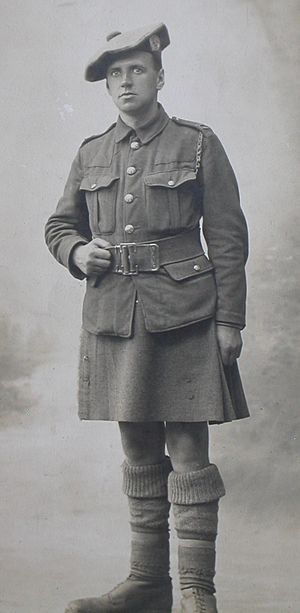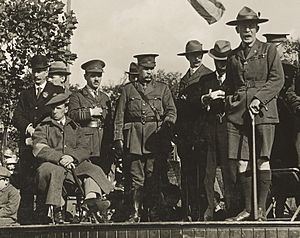Robert Edward Cruickshank facts for kids
Quick facts for kids
|
|
|---|---|

Private Robert Cruickshank circa 1915
|
|
| Born | 17 June 1888 Winnipeg, Manitoba, Canada |
| Died | 30 August 1961 (aged 73) Blaby, Leicestershire, England |
| Buried |
Gilroes Crematorium, Leicester, Leicestershire, England
|
| Allegiance | |
| Service/ |
|
| Rank | Major |
| Unit | London Scottish (WWI) Home Guard (WWII) |
| Battles/wars | First World War *Battle of the Somme Second World War (Home Guard) |
| Awards | Victoria Cross |
Major Robert Edward Cruickshank VC (born June 17, 1888 – died August 30, 1961) was a brave soldier. He was born in Canada but became a British hero. He received the Victoria Cross (VC), which is the highest award for courage in battle for British and Commonwealth forces.
Robert Cruickshank was born in Winnipeg, Manitoba, Canada, in 1888. He was the first of five children. When he was three, his family moved to England. They moved around quite a bit during his childhood.
During the First World War, he first joined the Royal Flying Corps. Later, he moved to the London Scottish army unit. He was hurt in the famous Battle of the Somme. After getting better, he went to Egypt. On May 1, 1918, he showed incredible bravery. He volunteered to carry an important message along the front line. Even though he was shot many times by a sniper, he kept trying to climb a steep hill. For his amazing courage, he was given the Victoria Cross.
After the war, he worked in business. He also served as a Major in the Home Guard during the Second World War. He helped with many local groups before he passed away in Leicestershire in 1961. His special medal is now kept in his old army unit's museum.
Contents
Robert Cruickshank's Early Life
Robert Cruickshank was born in Winnipeg in 1888. He was the oldest of five children. His two brothers and two sisters were born after the family moved to England. His youngest brother, John, sadly died at age 10 in 1913. His middle brother, Percy, also joined the army and died in France during the First World War when he was 19.
Robert moved to England when he was three years old. His father, also named Robert, was from Aberdeen. His father worked as an accountant for the Canadian Pacific Railway. In England, the family lived in Islington and later in Woodford. From 1903 to 1904, Robert went to Bancroft's School in Woodford.
After school, he became a traveling salesman. He worked for companies like Lipton and Lever Company. Robert was very interested in military life. From 1908 to 1911, he joined a volunteer army group called The City of London Yeomanry (Rough Riders). His family later moved to Harringay, North London. There, he became an Assistant Scoutmaster in the Scouting movement. He was also involved in local politics and was known as a good speaker.
Serving in World War I
When the First World War began, Robert first volunteered for the Royal Flying Corps. But he soon transferred to the London Scottish regiment. After his training, he was sent to France. He was part of the 1st Battalion. In September 1916, he was wounded during the Battle of the Somme at Leuze Wood.
He was sent back to England to recover from his injuries. Once he was better, he joined the 2nd Battalion. This unit first went to Salonika and then to Egypt.
Earning the Victoria Cross

Robert Cruickshank was 29 years old when he earned the Victoria Cross. He was a Private in the 2/14th (County of London) Battalion of the London Regiment (London Scottish).
On May 1, 1918, east of the Jordan River in Palestine, a fierce battle was happening against Turkish troops. Private Cruickshank's platoon was stuck at the bottom of a deep ditch, called a wadi. Their officer and most of the men were hurt. Robert bravely volunteered to take a message to company headquarters.
Here's what happened: His platoon was under heavy machine-gun fire. They had to go down a steep bank into the wadi. Many men were hit before they reached the bottom. The officer in charge was killed right away. The sergeant took over and sent a messenger for help, but he was also badly wounded. The corporal had already been killed. The only remaining leader, a lance-corporal, thought the first messenger was dead. He asked for a volunteer to take a second message.
Private Cruickshank immediately stepped forward. He rushed up the steep slope, but he was shot and fell back into the wadi. He got up again and tried to climb, but he was wounded again and rolled back down. After his wounds were bandaged, he tried a third time. He rushed up the slope again but fell, badly wounded. He could no longer stand. He rolled himself back, even as bullets flew around him. His injuries were too severe for him to try again. He lay in a dangerous spot all day, being shot at and wounded again. He showed amazing courage and strength. He remained cheerful and did not complain at all.
After this heroic action, he was sent back to England to recover. He was celebrated as a hero. He received his Victoria Cross at Buckingham Palace on October 24, 1918. His mother and fiancée were there to see him.
Life After the War
After the First World War, Robert married Gwendoline Mansell. They later moved to Southend. He went back to work for Lever Brothers, where he worked for 34 years selling margarine. In 1921, he helped unveil the Port Sunlight War Memorial. In Southend, he became very involved with the British Legion, which helps former soldiers. He served on many committees and was a chairman. In the mid-1930s, his job moved him and Gwendoline to Glen Parva, Leicester. They lived there for the rest of their lives.
During the Second World War, Robert Cruickshank volunteered for the Home Guard. He reached the rank of Major.
After the war, he continued to serve his community. He was part of many local groups, especially the Glen Parva Parish Council. He was their Chairman for 14 years, stepping down just before he died. He also stayed in touch with his old army friends and went to many reunions. Robert Cruickshank passed away on August 30, 1961. He was cremated, and his ashes were placed at Glen Parva Parish Church. His wife, Gwendoline, lived to be 103 years old. They did not have any children. On April 29, 2018, a special plaque was put up in his honor at Glen Parva Memorial Gardens. This was to celebrate 100 years since he received his Victoria Cross.
Remembering a Hero
After Robert Cruickshank's death, his wife gave his Victoria Cross medal to the London Scottish regiment. It is now kept in their Regimental Museum in London. In 2006, which was the 150th anniversary of the Victoria Cross, Bancroft's School put up plaques to remember both Robert Cruickshank and another hero, Lieutenant Colonel Newman VC.
In November 2013, Premier Greg Selinger of Manitoba, Canada, announced that a lake in Manitoba was renamed Cruickshank Lake to honor Robert Cruickshank.
 | Sharif Bey |
 | Hale Woodruff |
 | Richmond Barthé |
 | Purvis Young |

